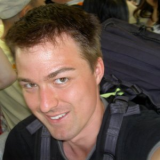I've been thinking a lot about learning and memory lately and there's been no shortage of interesting articles to read or videos to watch.
Over at wondr.net Jamin has started his Memory Month. He posts a new article every day, teaching you useful tricks for remembering everything from shopping lists and numbers to names of people you've just met. These methods will probably work great, but I'm to lazy to really sit down and do it since there's so many other things distracting me right now.
I don't believe in the old myth that humans only use 10% of the brain, but I do believe that there's a lot about the brain we don't understand at all yet, and maybe we never will. At Google Video they have some very interesting documentaries regarding the brain, for instance this documentary from Channel 5 in 2005 about Daniel Tammet or this one about Kim Peek. These savants have enormous counting skills huge memory capacities, but the brain power comes at a price. From mild autistic tendencies like Asperger's to completely anti-social autistic behavior.
It's been noted that these types of disorders are getting more and more common, especially in academic families and it's even been called The Geek Syndrome by Wired. The latest studies says that something between 3 and 20 genes are involved in causing these disorders. Incidentally this also seems to affect maths and science skills in a positive way. Abnormalities in the cerebellum, the "little brain" responsible for motor control and filtering sensory input and passing it on to the right part of the brain, is common in autistic persons. Kim Peek for instance, has a damaged cerebellum and no corpus callosum, the connection between the two halves of the brain, at all.
The brain is a pattern matching machine and it seems to me like it's automatically filtering the continuous flow of information washing over us, but if it's not filtered enough the person might be classified as slightly autistic. If the brain filters too much, parts of it just doesn't get used enough and will dwindle away. Of course this is an overly simple way of looking at it, but I'm certain it's a part of the puzzle.
I'm also convinced that the brain is a lot more flexible than people used to believe, even in grown ups. New born babies have twice the number of nerve cells they need, but the ones that aren't used just dies off. Usually this happens in two periods, first at a young age, then again around puberty. But the brain is not "frozen" after that at all. A recent study on mice shows that the nerve cells move around and stretch "in a highly dynamic fashion".
It's never too late to learn something new, but I think it's harder to really focus on learning just one thing when you're grown up compared to when you're still a kid. There's just too many things to think about and too many distractions, and so much interesting to learn.
Wish I didn't have to sleep so much, but a completely unscientific experiment on myself made me notice that when I sleep less then 6 hours per night, my memory isn't as good as it usually is. Things just don't stick. Also, I've noticed that I remember things I read in the evening better than the things I read in the morning. I imagine that my brain is working through the input from the day while sleeping, trying to keep only the seemingly important memories.
It's getting late, I'll go read a book.
Update: Great article about memory in National Geographic
Subscribe to:
Post Comments (Atom)

1 comment:
Sjukt coolt, fastnade en hel dag på att bara kolla på såna här filmer.
Post a Comment